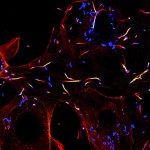Lien vers Pubmed [PMID] – 22908282
Proc. Natl. Acad. Sci. U.S.A. 2012 Sep;109(36):14556-61
Phagocytosis plays a critical role in both innate and adaptive immunity. Phagosomal fusion with late endosomes and lysosomes enhances proteolysis, causing degradation of the phagocytic content. Increased degradation participates in both innate protection against pathogens and the production of antigenic peptides for presentation to T lymphocytes during adaptive immune responses. Specific ligands present in the phagosomal cargo influence the rate of phagosome fusion with lysosomes, thereby modulating both antigen degradation and presentation. Using a combination of cell sorting techniques and single phagosome flow cytometry-based analysis, we found that opsonization with IgG accelerates antigen degradation within individual IgG-containing phagosomes, but not in other phagosomes present in the same cell and devoid of IgG. Likewise, IgG opsonization enhances antigen presentation to CD4(+) T lymphocytes only when antigen and IgG are present within the same phagosome, whereas cells containing phagosomes with either antigen or IgG alone failed to present antigen efficiently. Therefore, individual phagosomes behave autonomously, in terms of both cargo degradation and antigen presentation to CD4(+) T cells. Phagosomal autonomy could serve as a basis for the intracellular discrimination between self and nonself antigens, resulting in the preferential presentation of peptides derived from opsonized, nonself antigens.
